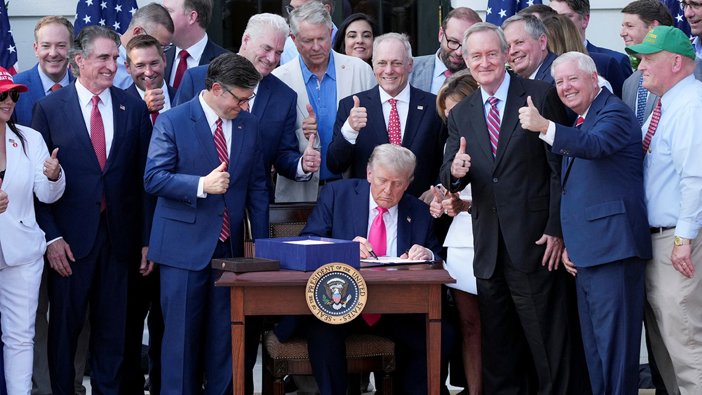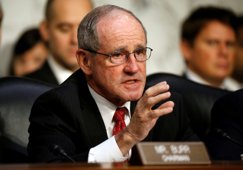
Trump’s Tax Cuts Boost Pay as Senate Debates $9B Cuts
Trump’s tax reform promises higher take-home pay as Senate debates $9B in spending cuts and fiscal policy divides GOP.
Trump’s “Big Beautiful Bill” Promises Sweeping Tax Relief
President Donald Trump’s “Big Beautiful Bill” is reshaping the nation’s economic outlook by locking in sweeping tax cuts and promising significant savings for millions of Americans. Signed into law on July 4, the legislation marks a cornerstone of Trump’s economic agenda and is being touted by the White House as a catalyst for renewed growth and financial relief. An interactive map published by the administration details projected real wage and take-home pay increases by state, showing how a typical family could pocket thousands more annually. For example, California families are expected to see a real wage increase of $4,900 to $8,800 and an additional $8,500 to $12,500 in annual take-home pay.
The bill permanently extends key provisions of Trump’s 2017 tax reforms, eliminates taxes on tips, overtime pay, and Social Security income for seniors, and expands the child tax credit. Treasury Secretary Scott Bessent hailed the reform, noting the average worker will keep $4,000 to $7,200 more in real wages each year. “The bill prevents a $4.5 trillion tax hike on the American people,” he wrote, adding that families can expect life-changing financial relief and greater opportunity. The law also allocates $350 billion for defense and immigration enforcement, rolls back certain green energy tax credits, and implements reforms in Medicaid.
Senate Navigates Contentious Spending Clawbacks
While the House and White House champion tax relief, the Senate is locked in a fierce debate over a $9 billion clawback package designed to cut previously approved funding for foreign aid and public broadcasting. The rescission effort, championed by Trump and GOP leaders, faced its first key votes this week, narrowly advancing thanks to Vice President JD Vance’s tie-breaking support.
The bill includes nearly $8 billion in cuts to the U.S. Agency for International Development and more than $1 billion to the Corporation for Public Broadcasting. Efforts to protect $400 million in global HIV/AIDS funding helped secure some GOP votes, but dissent remains. Senators Lisa Murkowski, Susan Collins, and Mitch McConnell joined Democrats in opposing the package, citing a lack of clarity and transparency in the proposed cuts. “Nobody really knows what program reductions are in it,” Collins noted, voicing concern over the bill’s rushed process and incomplete details.
Divided GOP Faces Pressure, Uncertain Outcome
House Speaker Mike Johnson has called on Senate Republicans to maintain the bill as passed, echoing demands from fiscal hawks for a disciplined approach to spending cuts. However, internal divisions persist, with critics like Rep. Thomas Massie and Elon Musk warning that the bill does not go far enough in reducing government spending. Arrington, House Budget Committee Chairman, defends the measure as a necessary compromise, emphasizing permanent pro-growth tax policy and the long-term need for continued fiscal reform.
As the Senate prepares for a protracted debate and possible amendment process, the final shape of the spending cuts remains uncertain. Lawmakers are bracing for hours of negotiations, with Democrats pledging to challenge reductions to social programs and Republicans weighing the balance between fiscal discipline and critical funding priorities. The bill’s outcome will set the tone for further budget battles and signal the direction of U.S. economic policy in the years ahead.






